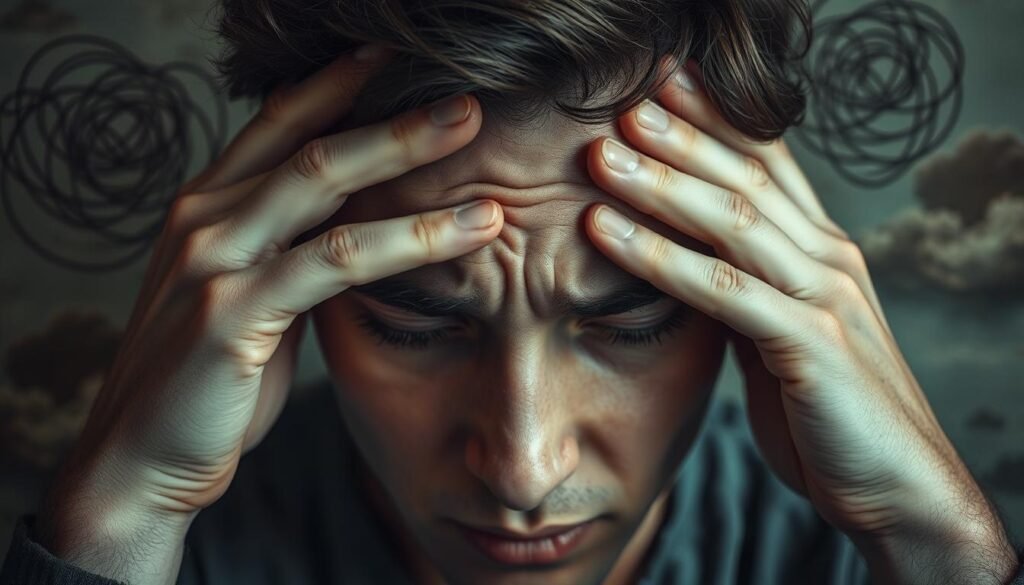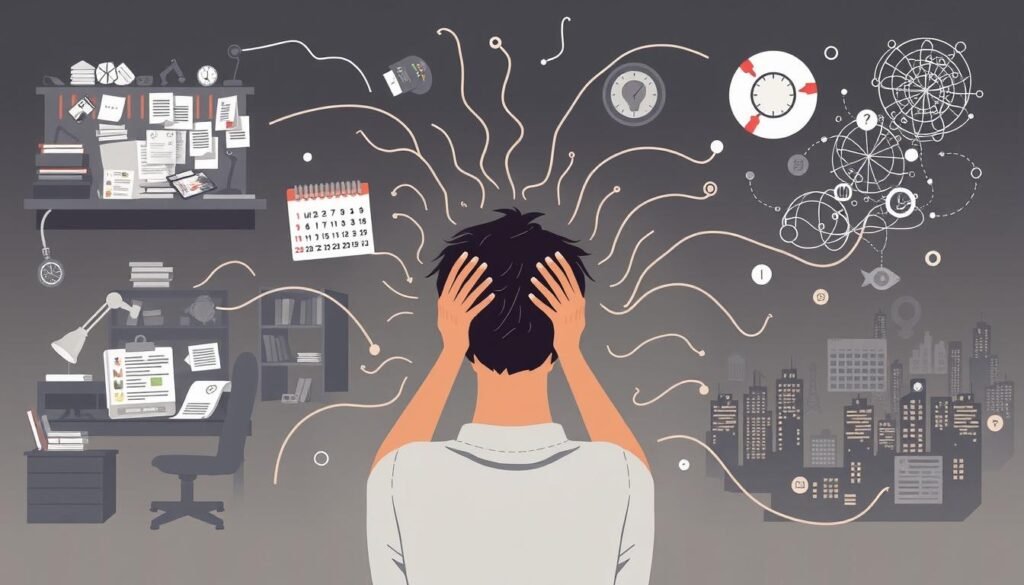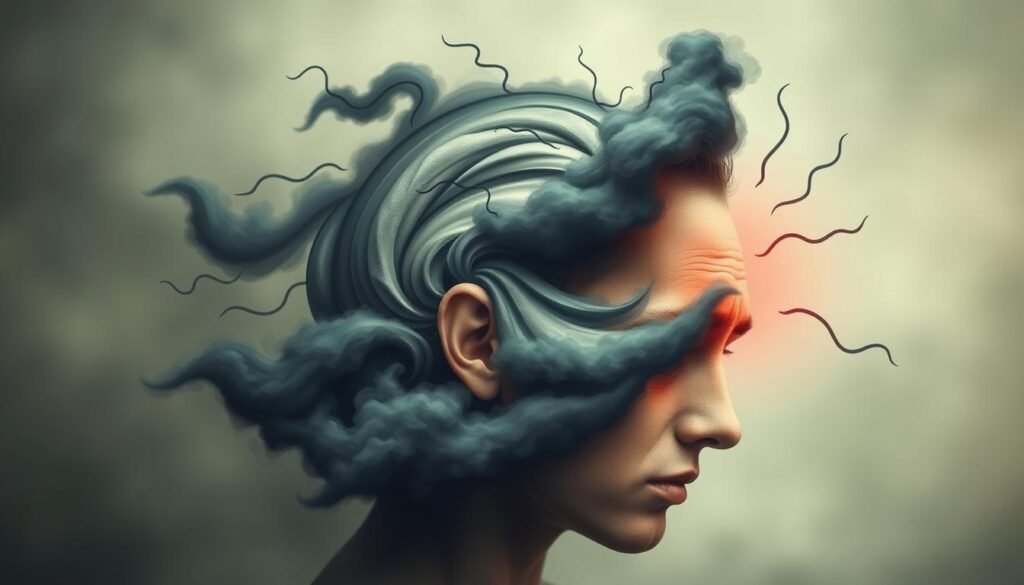Have you ever thought that your regular headache might actually link to anxiety? We often don’t see the connection between headaches caused by anxiety and how stress affects our lives. In the U.S., more than 40 million adults deal with anxiety disorders. Interesting research shows nearly half of American migraine sufferers also deal with anxiety. This piece explores why anxiety headaches happen, how to find relief, and how to prevent them. It’s all about taking charge of your symptoms to better your life quality.
Key Takeaways
- About 40 million adults in the U.S. struggle with anxiety, often leading to anxiety headaches.
- Approximately 37% of people with anxiety disorders experience migraines or tension headaches.
- Many individuals report a strong link between migraines and anxiety symptoms.
- Effective treatment options include cognitive behavioral therapy (CBT) and medication.
- Implementing stress management tactics can significantly reduce headache frequency.
- Maintaining a healthy lifestyle is crucial for prevention tips against anxiety headaches.
Understanding Anxiety and Its Symptoms
Anxiety is something many of us face in life. It includes different mental health issues that make us feel scared, worried, and stressed. These feelings can change how we handle day-to-day life. We may get easily upset, can’t relax, and worry too much.
Along with feeling stressed, our bodies might react too. People often notice their heart beating fast, feeling tired, and getting headaches. There’s a noticeable link between anxiety and headaches. In fact, about 40% of individuals with migraines might feel depressed too. Those with migraines also are more likely to have anxiety than those who don’t.
The way anxiety shows up can vary widely. Generalized Anxiety Disorder means worrying too much about daily things. Panic Disorder involves sudden, intense fear that comes out of nowhere. Social Anxiety Disorder and Specific Phobias show anxiety’s different faces. Sometimes, this worry can lead to more severe problems, like anxiety caused by using substances, which makes things worse.
It’s important to understand these signs and how they’re linked to anxiety. Knowing what to look for can help us spot anxiety headaches and other issues. Managing anxiety well is key. It helps reduce mental stress and the physical problems that come with it.
What is an Anxiety Headache?
Anxiety headaches come in two main types: tension and migraine headaches. Anxiety can trigger or worsen both. It helps to know the signs and what sets them off. Tension headaches usually feel like a tight band around your head. They come with a dull pain. You might also feel sore in your scalp, neck, and shoulders.
Migraine headaches hit harder. The pain often starts on one side of the head with a throbbing sensation. Migraines can make you feel sick and sensitive to light and sound. They can last from a few hours to days. People with anxiety disorders may get migraines more often.

Lifestyle plays a big role in anxiety headaches. Stress and anxiety can cause muscle tension or teeth grinding, leading to headaches. Improving your health with regular exercise can prevent these headaches. Getting enough sleep is also key to controlling stress. Without it, you’re more open to anxiety and headaches.
Relaxing a little each day can lower your anxiety and reduce headache risk. Over-the-counter meds like Advil Dual Action work well for tension headaches. There are also specific meds for migraines. Managing your stress and health can cut down on these headaches. Learn more about anxiety and headaches at this link.
Causes of Anxiety Headaches
Anxiety headaches come from many linked causes that seriously affect our well-being. Stress is a main reason. It’s a big trigger for headaches. When we’re stressed, our bodies react in a way that often leads to tension headaches. Being stressed for a long time makes us more sensitive to pain. This increases our chances of getting headaches more often.
Muscle tension is also a big factor in anxiety headaches. When anxious, people tend to tighten their muscles. This can cause a lot of discomfort and ongoing headaches. The pain from these headaches can make the anxiety even worse. So, it’s really important to deal with the emotions behind it.
Not sleeping well can make anxiety symptoms stronger. A lack of good sleep makes us feel more stressed. It also messes with our serotonin levels. Serotonin helps control our mood. So, when it’s out of balance, our emotions can get intense, leading to more headaches. Living in a way that keeps serotonin levels stable can help stop anxiety headaches.
All these issues – stress, tight muscles, and not enough serotonin – work together to cause anxiety headaches. By tackling these problems together, we can get better and have fewer headaches.

Common Symptoms of Anxiety Headaches
Anxiety headaches are mainly tension headaches. They come with mild to moderate pain, feeling like a tight band around the head. This pain spreads to the neck and shoulders, causing discomfort. It can last from a few hours to several days.
Migraine symptoms are more severe compared to tension headaches. Migraines usually cause throbbing pain on one side of the head. People might also feel sick and very sensitive to light and sound.
Knowing about tension headache symptoms helps in dealing with them. These symptoms come from stress affecting the body. It leads to muscle tension, changes in hormones, and more heat inside the body. These headaches often happen together with anxiety.
To find relief, spot the symptoms early. Stress management, like relaxing, working out, and drinking water, helps ease the pain. For more on managing tension headache symptoms, talk to a doctor.

Effective Relief Strategies for Anxiety Headaches
Finding relief for anxiety headaches means looking at different pain solutions. You can pick from over-the-counter options or prescription treatments for tough cases. Each method is designed to help with varying levels of headache severity and how often they happen.
Over-the-Counter Pain Relief Options
Many people use over-the-counter meds for headache relief. Options like ibuprofen, naproxen, and aspirin are easy to find. They help with mild to moderate headache pain. It’s key to use these meds correctly and talk to a doctor if needed.
Prescription Medications
For worse headaches, prescription options may work best. Drugs such as triptans are made for migraines. They tackle the changes in the brain that cause pain. It’s important to talk with a doctor to find the right treatment plan.
Using self-check tools can help people figure out their anxiety better. Quizzes and resources guide them to good management methods. For deeper understanding of anxiety, check out this page for a self-assessment.
| Medication Type | Common Brand Names | Usage |
|---|---|---|
| Over-the-Counter | Advil, Aleve, Bayer Aspirin | For mild to moderate anxiety headaches |
| Prescription | Imitrex, Maxalt | For severe headaches, often migraines |
Anxiety Headache: Coping Strategies and Relaxation Techniques
Anxiety headaches often come from too much stress. It’s important to find ways to deal with this stress for relief. Using relaxation methods every day can make you feel better overall. It can also help prevent many headaches.
Mindfulness Practices
Mindfulness means paying full attention to what’s happening right now. It’s a strong tool for lowering stress. Through meditation and focusing exercises, it helps ease anxiety and muscle tightness. By practicing regularly, you become calmer and more focused. This is very helpful for anyone dealing with anxiety headaches. To find out more about these practices, mindfulness is a good choice. Check out these specific relaxation techniques.
Breathing Exercises
Breathing exercises are great for handling anxiety headaches because they bring on relaxation. Learning to slow down your breathing through techniques like diaphragmatic breathing is key. This not only eases muscle tightness but can also help with anxiety’s physical effects. Making these exercises a part of your routine can really help with stress management. This leads to less anxiety headaches.
| Relaxation Technique | Benefits | Frequency of Practice |
|---|---|---|
| Mindfulness Meditation | Reduces stress, anxiety, and muscle tension | Daily, for at least 10 minutes |
| Breathing Exercises | Promotes relaxation and calms the mind | Several times a day, as needed |
| Yoga | Enhances flexibility, reduces stress | 2-3 times a week |
| Progressive Muscle Relaxation | Reduces tension throughout the body | As needed, preferably daily |
Prevention Tips for Anxiety Headaches
To stop anxiety headaches, it’s key to know what triggers them. This insight helps you tackle them early. A healthy lifestyle is also vital in keeping these headaches away.
Recognizing Headache Triggers
Figuring out what causes your headaches is a big step. Common triggers include:
- Stress and anxiety
- Poor sleep quality
- Certain dietary factors, such as caffeine or alcohol intake
- Muscle tension from posture or physical activity
Keeping a diary of your headaches is smart. It helps spot triggers. Change your lifestyle to avoid these triggers.
Maintaining a Healthy Lifestyle
Living healthy helps prevent headaches. Here’s what can help:
- Engage in regular physical activity to reduce stress and improve overall well-being.
- Stay adequately hydrated, as dehydration is a common headache trigger.
- Practice good sleep hygiene to enhance sleep quality and duration.
- Incorporate relaxation techniques such as meditation or yoga to alleviate stress.
These lifestyle tweaks can cut down on headache days. You’ll feel better, both mentally and physically.
| Healthy Practices | Benefits |
|---|---|
| Regular Exercise | Reduces stress and muscle tension |
| Hydration | Prevents dehydration-related headaches |
| Sleep Hygiene | Enhances sleep quality, reducing headache triggers |
| Relaxation Techniques | Decreases anxiety levels and headache frequency |
Knowing your triggers and living healthy are key to stopping headaches. This approach is your foundation for prevention.
When to Seek Professional Help
Anxiety headaches can disrupt your daily life. If headaches are frequent, severe, or don’t go away, get professional help. This is crucial when headaches come with other serious symptoms. A healthcare provider can diagnose you. This ensures any other health issues are found and treated.
People with anxiety may have a fast heartbeat, muscle twitches, and trouble sleeping. These can lead to head pressure and tension headaches. It’s a good idea to seek help from a mental health professional. Therapies, like cognitive-behavioral therapy, offer ways to handle these symptoms.
Research shows chronic anxiety can cause lots of headaches. This happens because of increased nervous system activity. That’s why seeing a therapist is important for many. They will help find the best treatment for you, making it easier to deal with anxiety and headaches.
Dealing with anxiety’s root causes can reduce symptoms like headaches. Realizing you need professional help is an important first step. For more on how anxiety and headaches are connected, check out this resource.
Conclusion
Anxiety headaches are common but they can be managed. Knowing the causes and signs is key. Looking into treatments like pain relievers, antidepressants, and stress reduction can help.
Techniques for relaxation, staying active, and getting enough sleep can improve your life. As science progresses, new and better treatments for anxiety and headaches will emerge. If you’re not sure what you’re experiencing, tools like the Do I Have Anxiety Test can help you figure out what to do next.
Getting professional advice is important for dealing with anxiety and headaches. By being aware and taking action early, you can overcome the hurdles of anxiety headaches.